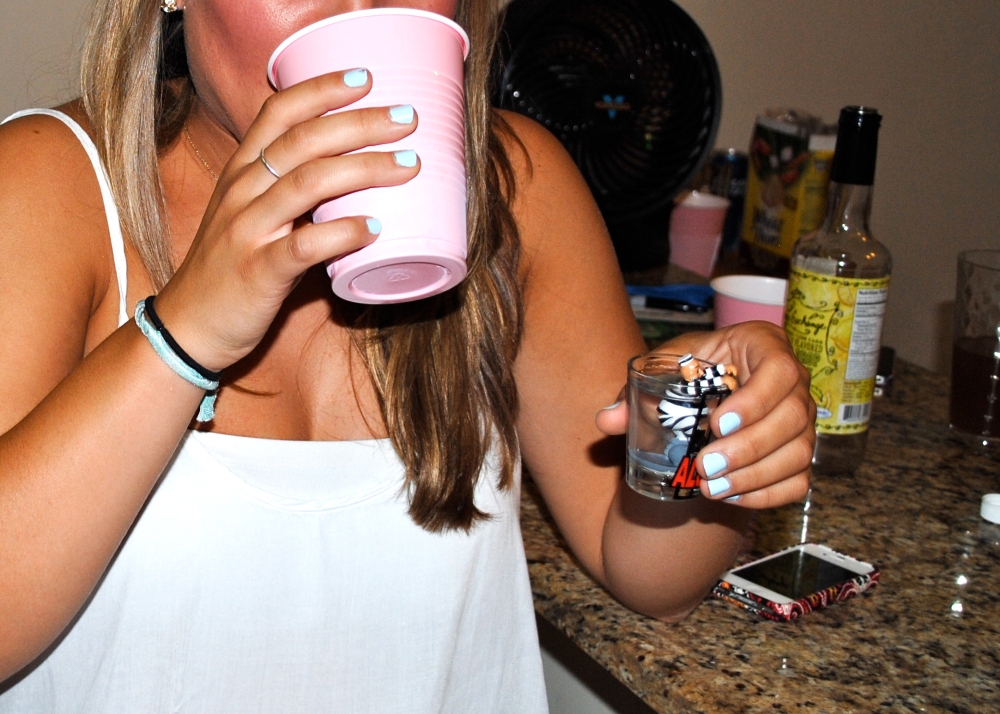By MICHAEL CHARBONEAU
STAFF WRITER

Photo by Tessa Van Bergen/The Ram While alcohol consumption rates in colleges concerns some, it seems that it may help in preventing abuse in the future.
It is no secret that college students drink or that alcohol is perceived to be a big part of the college experience. Like it or not, the drinking culture is an acknowledged fact of college life. That said, most people probably see students’ drinking habits as less than exemplary. All those late night keg stands have to be a one way ticket to a life of alcohol abuse, right? Maybe not. A new study from Pennsylvania State University suggests just the opposite: going to college could be a major factor in preventing alcoholism later in life.
Recently, a team of researchers at Penn State set out to determine what effect college attendance had on adult substance abuse. According to Penn State’s website, the researchers reanalyzed data from the 1979 National Longitudinal Youth Survey, which collected information from over 1,000 high school seniors in 1979, 1980 and 1994. The survey focused on college enrollment and measured the degree of adult substance abuse among the participants. The research team developed two groundbreaking new forms of statistical data analysis, called latent class analysis and causal inference, which they then applied to the survey. Stephanie Lanza, research associate professor of health and human development at Penn State, called the application of these methods in tandem “fairly novel,” but noted that it gave the researchers “an opportunity to discover fascinating patterns in the data that otherwise would not [have been] obvious.”
The results of their efforts are fascinating: Among low income youth and among youth whose mothers have a low level of education — groups that generally have lower college enrollment numbers — attending college could actually “prevent adult substance abuse,” according to a news report from Penn State. Strikingly, the researchers’ data shows that “adults would be more than six times more likely to engage in problem drinking at age 33 if they did not attend college, compared to if they did attend.”
The data is compelling, and the researchers clearly recognize the full implications of their work. Speaking with Penn State officials, Lanza remarked that “hypothetically, if we could send everyone in the United States to college, that would be protective overall and would significantly reduce problematic substance use in adulthood.”
Yet how does this data mesh with the use of alcohol on most college campuses? Can college drinking really prevent future alcoholism? Most Fordham students seemed to think that college could foster positive, non-addictive attitudes toward alcohol. For example, Jeff Coltin, FCRH ‘15, The Fordham Ram’s Bronx Correspondent, thinks that college is “the best time to develop healthy habits” on alcohol use.
“Yeah, you learn through experience,” said Nevin Kulungara, vice president of GSB ’15. Jack Greisdieck, FCRH ‘15, argued that experiences may vary from student to student, depending on his or her own personalities and “who you hang out with.” Kulungara also felt that one’s friends played an important role. “There definitely is something to be said about going to college and learning how to handle alcohol. You’re a lot less likely to get into bad habits with your friends around,” he said.
Students also pointed to the education that colleges provide about alcohol and other potentially addictive substances. When informed of the results of the Penn State study, Abby Wilson, FCRH ‘15, remarked that “there’s more education about the effects of drinking available on college campuses and support for people who are leaning more towards alcoholism,” services which are not as readily available to those who do not attend college.
Penn State’s groundbreaking new research puts the relationship between college students and alcohol in a different light. As various Fordham students have pointed out, drinking in college is almost always done recreationally and with friends. Although binge drinking does happen, the people with whom one drinks can have a positive influence on how alcohol gets used. Furthermore, college administrations take drinking very seriously. For example, Fordham requires all freshmen to take AlcoholEdu, which gives information about the effects of alcohol and drugs. Although students tend to complain about it, AlcoholEdu does provide important education about substance abuse and may have more of an effect on students’ use of alcohol than the students realize.
College students tend to get a bad rap: ‘They are binge drinkers; they do not understand the consequences of their decisions, and their behavior in college will only lead to addictions later in life.’ College students are certainly not perfect when it comes to substance abuse, but Penn State’s study, and the views of students here at Fordham suggest that alcohol use in college may be the best way to promote responsible relationships with alcohol. Smart decisions in college, it seems, lead to smart decisions later in life.
Michael Charboneau, FCRH ’15 is an English major from Birmingham, Mich.
